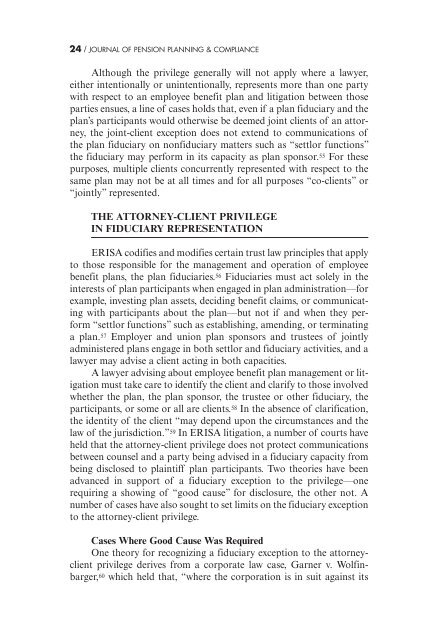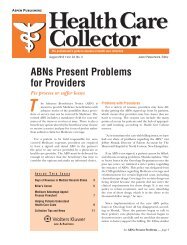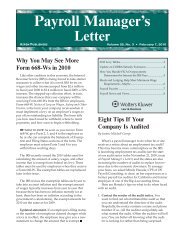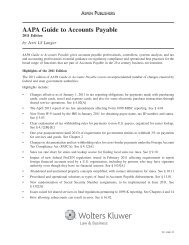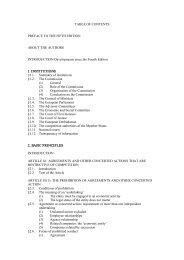journal of pension planning & compliance - Kluwer Law International
journal of pension planning & compliance - Kluwer Law International
journal of pension planning & compliance - Kluwer Law International
Create successful ePaper yourself
Turn your PDF publications into a flip-book with our unique Google optimized e-Paper software.
24 / JOURNAL OF PENSION PLANNING & COMPLIANCE<br />
Although the privilege generally will not apply where a lawyer,<br />
either intentionally or unintentionally, represents more than one party<br />
with respect to an employee benefit plan and litigation between those<br />
parties ensues, a line <strong>of</strong> cases holds that, even if a plan fiduciary and the<br />
plan’s participants would otherwise be deemed joint clients <strong>of</strong> an attorney,<br />
the joint-client exception does not extend to communications <strong>of</strong><br />
the plan fiduciary on nonfiduciary matters such as “settlor functions”<br />
the fiduciary may perform in its capacity as plan sponsor. 55 For these<br />
purposes, multiple clients concurrently represented with respect to the<br />
same plan may not be at all times and for all purposes “co-clients” or<br />
“jointly” represented.<br />
THE ATTORNEY-CLIENT PRIVILEGE<br />
IN FIDUCIARY REPRESENTATION<br />
ERISA codifies and modifies certain trust law principles that apply<br />
to those responsible for the management and operation <strong>of</strong> employee<br />
benefit plans, the plan fiduciaries. 56 Fiduciaries must act solely in the<br />
interests <strong>of</strong> plan participants when engaged in plan administration—for<br />
example, investing plan assets, deciding benefit claims, or communicating<br />
with participants about the plan—but not if and when they perform<br />
“settlor functions” such as establishing, amending, or terminating<br />
a plan. 57 Employer and union plan sponsors and trustees <strong>of</strong> jointly<br />
administered plans engage in both settlor and fiduciary activities, and a<br />
lawyer may advise a client acting in both capacities.<br />
A lawyer advising about employee benefit plan management or litigation<br />
must take care to identify the client and clarify to those involved<br />
whether the plan, the plan sponsor, the trustee or other fiduciary, the<br />
participants, or some or all are clients. 58 In the absence <strong>of</strong> clarification,<br />
the identity <strong>of</strong> the client “may depend upon the circumstances and the<br />
law <strong>of</strong> the jurisdiction.” 59 In ERISA litigation, a number <strong>of</strong> courts have<br />
held that the attorney-client privilege does not protect communications<br />
between counsel and a party being advised in a fiduciary capacity from<br />
being disclosed to plaintiff plan participants. Two theories have been<br />
advanced in support <strong>of</strong> a fiduciary exception to the privilege—one<br />
requiring a showing <strong>of</strong> “good cause” for disclosure, the other not. A<br />
number <strong>of</strong> cases have also sought to set limits on the fiduciary exception<br />
to the attorney-client privilege.<br />
Cases Where Good Cause Was Required<br />
One theory for recognizing a fiduciary exception to the attorneyclient<br />
privilege derives from a corporate law case, Garner v. Wolfinbarger,<br />
60 which held that, “where the corporation is in suit against its


